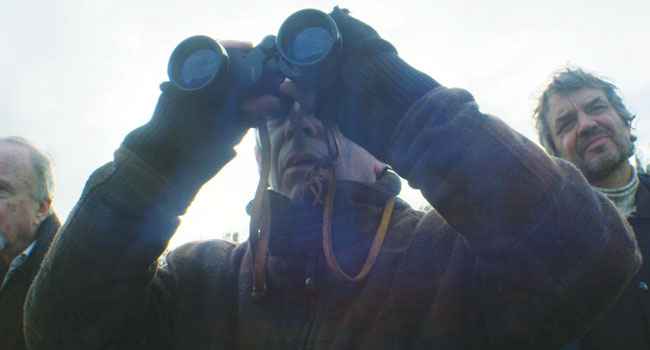Pablo Larraín’s “The Club,” the Chilean nominee for the
Oscar for Best Foreign Language Film and the winner of the Grand Jury Prize at
the Berlin Film Festival, is a searing, riveting indictment of the Catholic
Church told through the story of a group of disgraced priests forced into
imprisonment in a beach house. These men have strict rules about when they can
leave the home, and are told never to speak to anyone. Just as the Catholic
Church has been moving around pedophile priests and protecting their
identities, these men are forced into this remote location to live out their days
in solitude. And yet from the beginning of Larraín’s visually striking
work, they’re pushing the boundaries of their restrictions, even with the help
of the woman sent by the church to monitor them. They’ve been caring for a race dog, and
have been watching it win races from a distance. They’ve begun to look back at
the civilized world, and that world is about to come crashing to their doorstep.
“The Club” really centers on the arrival of two men—a priest
who will join them in sequestered life, followed shortly by a younger man named
Sandokan claiming abuse by said religious official. And he claims it loudly. In
a riveting sequence, the man shouts details about his abuse at the house from
the front step. The priests inside don’t know how to respond. They pace. They
are visibly nervous. What if people hear the accuser? What should they do? A
gun appears, and the new resident is told to go and basically fire
a warning shot at his accuser. He puts one in his own brain instead.
Naturally, such a violent incident brings attention, and
another new religious official arrives, this time to essentially quiz the men
about their pasts and figure out their future. While these gentlemen haven’t
exactly embraced their near-imprisonment, the prospect of being discovered, sent to jail, or worse seems to now be on the table. They have to act, and act
drastically, to maintain even their meager way of life. The final act of “The Club”
is narratively fascinating in the way Larraín uses this tale as a study in the failure
and corruption of religious institutions worldwide, groups that often scapegoat
victims and commit new crimes to cover up the old ones.
“The Club” is a visually arresting film, shot through blues
and grays that make it always look like twilight by Sergio Armstrong (who also
shot Larraín’s “No” and Sebastián Silva’s “The Maid”). Much of it also looks like we’re seeing
the action through a dirty, beveled window, the light from this beach town overwhelming
the lens. And Larraín and Armstrong stay tight in close-ups on their characters’ faces, many of which look like they reflect years of conflict and depression.
Just look at Sandokan’s (Roberto Farías) unkempt mop of hair and beard, as if
he has been fractured to the point that he can’t really understand. Antonia
Zegers gives an excellent performance as the woman who controls these men to
protect a church she clearly still loves, but who also seems to enjoy being the
conduit between them and the real world. She likes the control. In fact, these
are all men who had control at some point in their life, and they seem to have difficulty
giving that up.
Perhaps what’s most remarkable about “The Club” is that it’s
a film about very serious subjects that doesn’t feel at all torturous. In fact,
some have gone as far as calling it a pitch-black comedy given the scrambling
on the part of the Fathers as they try to salvage their pathetic lives. In the
end, that’s a major part of what Larraín is asking: As the church goes to
extremes to hide its own sins, what is it really protecting anymore? Is it
worth saving? And yet none of this fascinating drama feels like a lecture. It’s
a movie that almost doesn’t reveal its brilliance until it’s over, as one
ponders its themes and appreciates its deft, light touch. Larrain doesn’t
present easy answers—and I love the unpredictable ending of the piece—letting viewers
walk away and discuss the themes of “The Club” more than be handed easy
answers. With an issue like this, from a daring filmmaker like this, easy
answers are the last thing we need.












